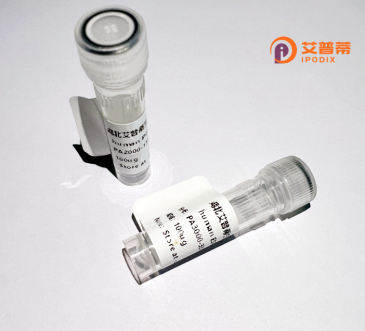
| 纯度 | >90%SDS-PAGE. |
| 种属 | Human |
| 靶点 | ATOH8 |
| Uniprot No | Q96SQ7 |
| 内毒素 | < 0.01EU/μg |
| 表达宿主 | E.coli |
| 表达区间 | 1-321aa |
| 氨基酸序列 | MKHIPVLEDG PWKTVCVKEL NGLKKLKRKG KEPARRANGY KTFRLDLEAP EPRAVATNGL RDRTHRLQPV PVPVPVPVPV APAVPPRGGT DTAGERGGSR APEVSDARKR CFALGAVGPG LPTPPPPPPP APQSQAPGGP EAQPFREPGL RPRILLCAPP ARPAPSAPPA PPAPPESTVR PAPPTRPGES SYSSISHVIY NNHQDSSASP RKRPGEATAA SSEIKALQQT RRLLANARER TRVHTISAAF EALRKQVPCY SYGQKLSKLA ILRIACNYIL SLARLADLDY SADHSNLSFS ECVQRCTRTL QAEGRAKKRK E |
| 分子量 | 61 kDa |
| 蛋白标签 | GST-tag at N-terminal |
| 缓冲液 | 冻干粉 |
| 稳定性 & 储存条件 | Lyophilized protein should be stored at ≤ -20°C, stable for one year after receipt. Reconstituted protein solution can be stored at 2-8°C for 2-7 days. Aliquots of reconstituted samples are stable at ≤ -20°C for 3 months. |
| 复溶 | Always centrifuge tubes before opening.Do not mix by vortex or pipetting. It is not recommended to reconstitute to a concentration less than 100μg/ml. Dissolve the lyophilized protein in distilled water. Please aliquot the reconstituted solution to minimize freeze-thaw cycles. |
以下是关于重组人蛋白ATOH8的3篇参考文献及简要摘要:
---
1. **文献名称**: *ATOH8 modulates the Wnt/β-catenin pathway by promoting β-catenin degradation in hepatocellular carcinoma*
**作者**: Li Y, et al.
**摘要**: 研究发现ATOH8通过促进β-catenin的泛素化降解抑制Wnt信号通路,在肝细胞癌中发挥抑癌作用,其低表达与肿瘤进展和患者预后不良相关。
2. **文献名称**: *ATOH8 regulates the differentiation and function of insulin-producing cells via MEK/ERK signaling*
**作者**: Park JH, et al.
**摘要**: 在小鼠模型及体外实验中,ATOH8通过调控MEK/ERK通路参与胰岛β细胞分化与功能维持,为糖尿病治疗提供潜在靶点。
3. **文献名称**: *ATOH8 interacts with EZH2 to repress pro-apoptotic genes in acute myeloid leukemia*
**作者**: Wang X, et al.
**摘要**: 揭示ATOH8与表观调控因子EZH2结合,抑制促凋亡基因表达,促进急性髓系白血病细胞存活,其高表达与化疗耐药相关。
---
以上文献涉及ATOH8在癌症、代谢疾病中的分子机制及治疗潜力。如需具体期刊及年份,建议通过PubMed/Google Scholar按标题检索获取全文信息。
ATOH8 (Atonal Homolog 8) is a member of the Atonal family of basic helix-loop-helix (bHLH) transcription factors, known for their roles in cell differentiation and development. First identified through homology with the *Drosophila* Atonal protein, ATOH8 is evolutionarily conserved and implicated in neurogenesis, organogenesis, and tissue homeostasis. It regulates gene expression by binding E-box DNA motifs, often interacting with other bHLH proteins to modulate cellular fate decisions.
During embryogenesis, ATOH8 is critical in developing the nervous system, pancreas, kidneys, and retina. It promotes neuronal differentiation by suppressing progenitor cell proliferation and activating lineage-specific genes. Notably, it shares functional overlap with other Atonal proteins (e.g., ATOH1) but exhibits distinct expression patterns and downstream targets. Studies highlight its role in pancreatic β-cell differentiation and kidney podocyte development, linking its dysregulation to metabolic and renal disorders.
ATOH8 also displays dual roles in cancer, acting as a tumor suppressor by inducing cell cycle arrest or apoptosis in some contexts (e.g., hepatocellular carcinoma) but promoting metastasis in others (e.g., colorectal cancer). Its activity is tightly regulated by epigenetic modifications, miRNA interactions, and signaling pathways like Wnt and Notch. Despite progress, its precise mechanisms and context-dependent roles remain under investigation, with potential implications for regenerative medicine and cancer therapy.
×